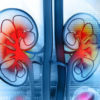What is GERD?
 GERD is a malady in which partially digested food and natural acids in the stomach seep upward into the esophagus, the long tube that carries food and liquids from the mouth to the stomach. This malfunction happens because the lower esophageal sphincter, which opens into the stomach, unexpectedly opens enough to allow stomach contents back into the esophagus, throat, and sometimes mouth. This process can evoke a foul taste. It can also create uncomfortable bloating or burning sensations in areas along the digestive tract, which are not equipped to handle stomach acids.
GERD is a malady in which partially digested food and natural acids in the stomach seep upward into the esophagus, the long tube that carries food and liquids from the mouth to the stomach. This malfunction happens because the lower esophageal sphincter, which opens into the stomach, unexpectedly opens enough to allow stomach contents back into the esophagus, throat, and sometimes mouth. This process can evoke a foul taste. It can also create uncomfortable bloating or burning sensations in areas along the digestive tract, which are not equipped to handle stomach acids.
Many people often confuse GERD with acid reflux. Fundamentally, acid reflux is the same malfunction as GERD. However, whereas acid reflux is a temporary ailment, GERD is chronic, occurring at least twice a week over many consecutive weeks. It can be caused by more than just a spicy meal or stress and can result in further problems if left unchecked or medically undiagnosed.
What Are GERD Symptoms?
GERD often feels like heartburn, which produces an uncomfortable burning sensation in the middle of the chest toward the throat. Other major symptoms of GERD include:
- Nausea
- Pain swallowing
- Chronic cough
- Chest pain
- Loss of appetite
- Persistent vomiting
If these types of symptoms are continual, a gastroenterologist or medical specialist should be consulted.
What Are the Risk Factors for GERD?
Several risk factors are associated with GERD. These include:
- Obesity or being overweight
- Pregnancy and excessive pressure on the abdomen
- Frequently eating foods that produce stomach pH imbalance such as dairy, spicy, or fried foods
- Smoking or exposure to secondhand smoke
- Certain medications for sleep, blood pressure, asthma, and depression
A person with a hiatal hernia can also be more at risk for developing GERD, as internal organs are apt to shift around the abdominopelvic cavity. These shifts can strain the esophageal sphincter, forcing it open and enabling acid to be released upward. People over 40 years of age are also more prone to developing GERD.
How Is GERD Diagnosed?
GERD can be diagnosed at Bergen Medical Associates in various ways. In general, it is diagnosed by taking a careful medical history of the patient and using the following medical tools to help identify GERD, ruling out any other conditions. The tools and tests for GERD include:
Upper Gastrointestinal Endoscopy and Biopsy
An endoscope or long tube is tracked through the esophagus, stomach, and duodenum to examine their status. A tissue biopsy may be taken and tested for signs of GERD.
Upper Gastrointestinal X-Ray Series
Multiple X-rays are taken of the upper gastrointestinal chamber as the patient drinks barium liquid.
pH Monitoring
Two types of tests – esophageal pH and impedance test and the wireless esophageal pH test – can help detect the level of pH the patient regularly experiences during a 24- to 48-hour span. In both cases, a monitor is inserted into the stomach that measures the pH of the patient, as she or he eats and sleeps under normal circumstances.
Esophageal Manometry
This test examines the esophageal capability to move food into the stomach. A small flexible tube is inserted into the nose, and the tube’s sensors measure sphincter strength as the patient ingests food.
What Are GERD Treatment Options?
There are a variety of non-invasive ways to treat GERD and prevent its return. Several lifestyle changes can be made to reduce the likelihood of developing the condition or to minimize its effects. These changes can start with modifying diet and avoiding or decreasing the number of certain foods and drinks, such as:
- Dairy
- Sugar
- Chocolate
- Tomato sauces and other acidic sauces
- Garlic and onions
- Alcohol, caffeinated tea, coffee, and carbonated drinks
- Citrus fruits
Avoiding foods and drinks that are spicy, fried, fatty, and greasy is also recommended to minimize the risk of developing GERD. In addition, patients with GERD can reduce symptoms by:
- Maintaining a healthy weight
- Eating small, more frequent meals
- Ceasing smoking
- Sitting and staying upright while eating and for an hour after
- Refraining from eating at least three hours before lying down in bed
- Wearing clothing that doesn’t tightly hug the waistline
- Raising the head of the bed six to eight inches above the base
A gastroenterologist may suggest taking over-the-counter or prescription drugs to gain relief from GERD symptoms. These medicines include:
- Antacids
- H-2 receptor blockers
- Proton pump inhibitors
- Other prescription drugs
If these first lines of defense are not working, minimally invasive surgeries, such as laparoscopic anti-reflux surgery or LINX device implantation, may be options. A LINX device is a small ring of calibrated magnets placed around the lower esophageal sphincter, to prevent reflux.
Find Comprehensive Care at Bergen Medical Associates
Bergen Medical Associates provides an experienced team of board-certified gastroenterologists and medical professionals to help diagnose and treat GERD. We are glad to be a leader in comprehensive care at our convenient locations throughout northern New Jersey for all gastrointestinal diseases and conditions, such as GERD and irritable bowel syndrome. For more information, request an appointment or contact us today.












